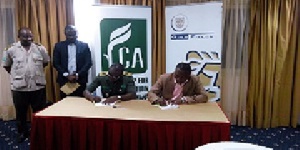The Leadership for Conservation in Africa – Ghana (LCA) has handed over three luxurious tent camps located in Shai Hills Resource Reserve to the Forestry Commission.
The erected tents formed part of LCA’s initiative to commercialise the reserve and open it up to more tourists, and thereby increase revenue generated to promote its conservation activities.
At a short handing-over ceremony in Accra, Chief Executive Officer (CEO) of LCA, Mr Chris Murai expressed his gratitude to Gold Fields Ghana Limited for spearheading the initiative of LCA.
He added that preliminary works done at the reserve showed that the area has a great potential of becoming a heritage site, and not just for tourism.
He called for a Public-Private Partnership (PPP) for the conservation of the reserve, and said the three tents are equivalent to a five-star hotel.
Mr Murai mentioned that an investor has been identified to manage the tents, and when the necessary paper works have been completed, they will name the investor.
The Executive Vice-President and Head of West Africa for Gold Fields Ghana, Mr Alfred Baku, mentioned that his company’s gesture goes to debunk the perception that mining companies are not environmentally friendly, saying: “Gold Fields had a footprint of being responsible and a believer in community engagement to promote sustainable conservation”.
He also urged the Forestry Commission to ensure and adopt a good maintenance attitude towards the preservation of the tent for use by the next generation.
Chief Executive Officer of the commission, Mr Samuel Afari Dartey, thanked the LCA and Gold Fields Ghana for the construction, and added that the Shai Hills had the potential to be much better than the Mole Park when developed.
He said his outfit is seeking for a partner to develop the 51-kilometre reserve through the rehabilitation of its 33-kilometre perimeter fence, the provision of dugouts and the expansion of three luxury tent camp accommodation facility.
It will also involve the reintroduction of different species of wildlife and the development of innovative ecotourism products to provide rare and desired experience for the increasing number of visitors to the reserve.
Regional News of Wednesday, 6 April 2016
Source: thefinderonline.com













